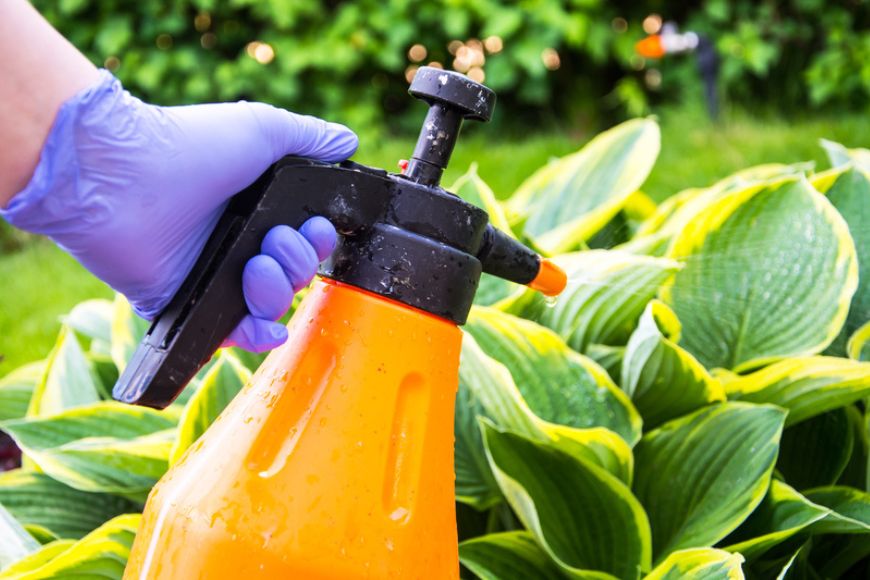
Tips to Reduce & Prevent Common Garden Pests
Many people grow their own fruits and vegetables so that they can eat fresh and healthy food from their backyard. So using poison to kill insect pests on the things that you are going to be eating isn’t too appealing.
There are many natural pesticides that you can buy to spray on those pests that will keep them under control, without endangering your health.
Benefits of Natural Pesticides
Natural pesticides, whether homemade or store bought, are good for you, your garden and the earth. Among the many benefits:
- They are better for your health
- They won’t damage the environment
- They break down quickly
- They will not build up in the soil
- The pests are less likely to build up a resistance
- And in most cases, they are significantly cheaper than chemical fertilizers
As you are looking for the right pesticides, read the packing information carefully. Just because something is store bought doesn’t mean it isn’t natural. Many pesticides that you find online or in a store are made from organic sources, and this will save you the trouble of making and mixing.
Natural Choices
When you apply natural pesticides, you still have to follow some safety rules. Just because something comes from a plant, doesn’t mean that it is 100% safe to apply any way that you choose. Make sure that you follow these rules:
- Always test on a small area of one plant to see if it is safe
- Wear gloves and a mask when you apply
- Don’t spray when it is windy
- Spray during the cool parts of the day–morning or evening
Beer
Works on slugs, snails.
This is very simple, just pour beer in a dish, 2-4 inches deep and set it near the plants that are being damaged. Check every morning and refill as needed in the evening
Dish Soap
Works on aphids, beetles, mites and whiteflies
For slugs and snails, you can put a little soap in water, in a shallow container near plants. They come for the water and are done in by the soap.
For the other insects, you make the spray by adding 2 teaspoons of dish soap per gallon of water. Pour in a spray bottle and spray on both sides of the leaves. Try to spay during cooler parts of the day. It lasts up to a week
Diatomaceous Earth
Works on ants, fleas, slugs and snails.
Make sure that you use the horticultural grade diatomaceous earth. Follow instructions from the manufacturer on the container. Use gloves and broadcast on and around your plants. This should last up to a week.
Garlic Spray
aphids, mites, caterpillars, armyworms, cutworms, beetles, slugs, mosquitoes, and flies
Blend 6 garlic cloves 5 cups water
Add 4 drops dish soap, 2 drops of vegetable oil
Strain and pour into spray bottle
Spray on leaves
Last about a week
Hot Pepper Spray
Works on aphids and spider mites
Just mix 6 drops of soap, 2 tablespoons dried red or cayenne pepper with one gallon of water. Shake well before and during use. Spray on the leaves during the evening as the air is cooling. Lasts 3-4 days.
Neem Oil
Good for aphids, beetles, caterpillars, leafhoppers, mites, mealybugs, scale, thrip and whiteflies
You can buy either ready to use neem oil already mixed properly or neem oil itself and then mix it according to directions. Apply according to the instructions on the packaging. It should last 1-2 weeks.
Pyrethrin
Works on aphids, leafhoppers, mealybugs, scale, spider mites, stink bugs, whiteflies and thrips
While it might sound like a man-made chemical, it is actually made from dalmatian chrysanthemums or pyrethrum daisies.
To make it yourself, bleed 2 cups of dried flowers and mix with one gallon of water. Strain and pour into your spray bottle. Apply in the evening–the air temp needs to be below 85 degrees. Spray it on the leaves, and it should last up to a week.
Tomato Leaf Spray
Works on aphids, spider mites.
All you need to do is pick and chop 2 cups of tomato leaves, let the leaves soak in 4 cups of water for 24 hours, then strain and pour into a spray bottle. Spray on your plants and you should be rid of aphids and spider mites for up to a week.
Vegetable Oil
Works on aphids, beetles, mites, thrips and whiteflies.
Mix 3 tablespoons of dish soap, 3 cups vegetable oil, 3 quarts water, then shake well before you pour it into a spray bottle. Spray leaves, shaking regularly, to keep it mixed. Use during morning or evening when cool, and should last up to a week.
Vinegar
Works on ants, flies, slugs, snails.
Add 6 drops of dish soap to 1 cup vinegar and 4 cups water. Mix and add to your spray bottle. Spray the leaves where you see signs of insects. Make sure that you apply during morning or evening, when the air is cool. Lasts from 7-10 days.
Gardening can be a fun and healthy pastime, but seeing your hard work and sweat eaten up by insects and other pests can be discouraging. You can easily and safely solve this problem by using natural and home made pesticides–things that you know won’t damage the health of you and your family.
Just make sure that you test them before you spray and that you apply them properly–wearing a mask and gloves and making sure that the weather is suited for application. Happy pest-free gardening!
